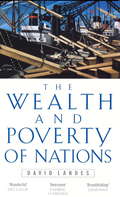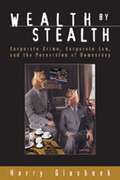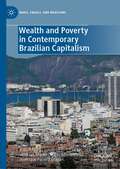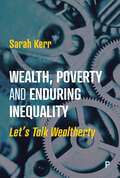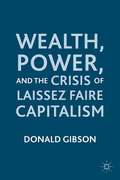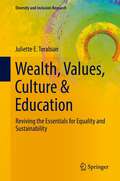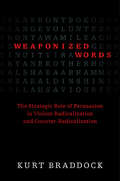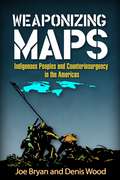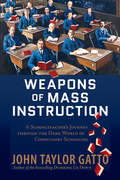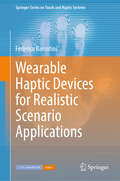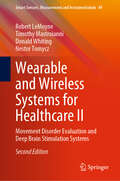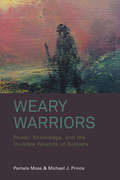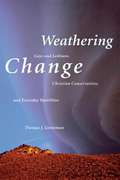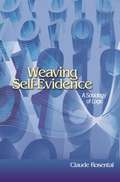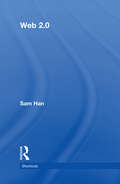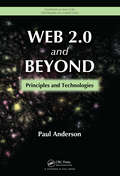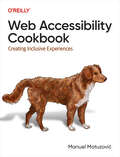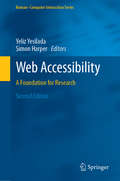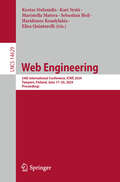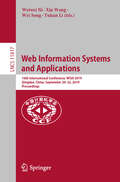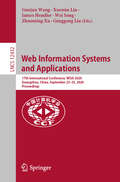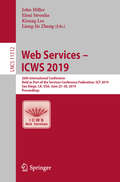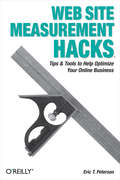- Table View
- List View
Wealth And Poverty Of Nations: Why Some Are So Rich And Some So Poor
by David S. LandesThe history of nations is a history of haves and have-nots, and as we approach the millennium, the gap between rich and poor countries is widening. In this engrossing and important new work, eminent historian David Landes explores the complex, fascinating and often startling causes of the wealth and poverty of nations. The answers are found not only in the large forces at work in economies: geography, religion, the broad swings of politics, but also in the small surprising details. In Europe, the invention of spectacles doubled the working life of skilled craftsmen, and played a prominent role in the creation of articulated machines, and in China, the failure to adopt the clock fundamentally hindered economic development.The relief of poverty is vital to the survival of us all. As David Landes brilliantly shows, the key to future success lies in understanding the lessons the past has to teach us - lessons uniquely imparted in this groundbreaking and vital book which exemplifies narrative history at its best.
Wealth By Stealth: Corporate Crime, Corporate Law, and the Perversion of Democracy
by Harry GlasbeekHow is it that corporations are able to behave irresponsibly, criminally, and undemocratically? Wealth by Stealth is a scathing introduction to the operations of the modern corporation, written by a corporate lawyer. Many writers point to the growth of undemocratic corporate power. Glasbeek takes these observations further and outlines clearly how corporations become so powerful. He also shows how they are able to act without regard to the behaviour and laws governing citizens and other groups. Glasbeek is known by generations of students for his brilliant, funny lectures at Osgoode Hall Law School. With Wealth by Stealth his informative critique of corporate behaviour becomes available and accessible to all. How is it “The corporation makes them do it”?
Wealth and Poverty in Contemporary Brazilian Capitalism (Marx, Engels, and Marxisms)
by Gustavo Moura de Cavalcanti Mello Henrique Pereira BragaThis book analyses contemporary capitalism from Brazil and from the Marxian critique of political economy, particularly; the co-dependency of wealth and poverty and of civilization and barbarism; the current tendency towards capital over-accumulation and the specific form assumed by the capitalist crisis in recent decades; the financialisation process of capital accumulation, its effects on the world of labour; and the place that the state assumes in this broad process. Current trends toward increasing social inequality, impoverishment of large sections of the population, precariousness of labour and rising unemployment, environmental destruction, the spread of austerity policies and the suppression of social policies, the rise of the far right (together with the strengthening of racism, misogyny, xenophobia, political and religious fanaticism and all manner of intolerance, etc.), low economic growth, the primacy of the financial dimension of capital accumulation, all need to be understood in their multiple and complex articulations, as fundamental and inherent elements of contemporary capitalism, associating empirical analysis with conceptual construction. Because they are strictly contradictory processes, a dialectical approach is required that reclaims the Marxian legacy, and aims to contribute to updating it, seeking to bring new and relevant elements to the Marxist debate, based on a specific interpretation of Marx's work, and as an immediate empirical basis the Brazilian reality.
Wealth, Health, and Democracy in East Asia and Latin America
by James W. McguireWhy do some societies fare well, and others poorly, at reducing the risk of early death? Wealth, Health, and Democracy in East Asia and Latin America finds that the public provision of basic health care and other inexpensive social services has reduced mortality rapidly even in tough economic circumstances, and that political democracy has contributed to the provision and utilization of such social services, in a wider range of ways than is sometimes recognized. These conclusions are based on case studies of Argentina, Brazil, Chile, Costa Rica, Indonesia, South Korea, Taiwan, and Thailand, as well as on cross-national comparisons involving these cases and others.
Wealth, Poverty and Enduring Inequality: Let’s Talk Wealtherty
by Sarah KerrThe rich and the poor in the UK are subject to radically different legislative approaches. While the behaviours of the poor are relentlessly scrutinised, those of the rich are ignored or enabled. In this book, Sarah Kerr suggests that we live in a state of ‘wealtherty’, characterised by the hyper-concentration of wealth and a stark distinction between the rich and the rest. Drawing on evidence from the 1500s onwards, she reveals a long history of government scrutiny of the poor and ignorance of the rich. She contests contemporary policy and practice which disregards the enduring role of the rich in the production of poverty and poverty in the production of the rich. In pursuit of social and economic justice, this radical book challenges policy makers and researchers to stop talking about poverty and to start addressing the problems caused by wealtherty.
Wealth, Power, and the Crisis of Laissez Faire Capitalism
by Donald GibsonThis forcefully argued book offers a provocative picture of the political, intellectual, and economic forces that have shaped the history of the United States, offering an extensive and in-depth critique of laissez-faire doctrine and a novel reformulation of the work of American System writers, Gibson traces America's rise to global supremacy.
Wealth, Values, Culture & Education: Reviving the essentials for equality & sustainability (Diversity and Inclusion Research)
by Juliette E. Torabian“The book on offer here is fascinating. I do not think it is proper to classify it as ‘philosophy’ or ‘sociology’ or ‘comparative education’. It is a work sui generis. Its cultural and historical range is extraordinary. Its illustrations are themselves arresting. Its literature is well outside disciplinary conventions and ranges across a number of languages. Mirabile dictu!” Professor Robert Cowen How have modern societies arrived at assuming: · Culture is non-essential! · Higher education is to train economically but not socio-politically active & engaged citizens! · Economic wealth is the most important and prominent form of individual and national assets! · Precariousness and socio-economic gaps are due to individuals’ skills and capacities but not the failure of legal, political, and social systems! · Freedom and equality are about “choices in having” but not necessarily about “ways of being and becoming”! Torabian argues these assumptions have not been constructed overnight and that COVID-19 has simply revealed their long-term fabrication and impact since the 1970s. This book is a fascinating voyage from the Middle Ages to today. It travels across different socio-cultural and political contexts drawing on arts, literary works, music, philosophical thoughts, economic and social concepts. It explores value systems and perceptions of wealth, poverty, and inequality and depicts the mutual impact and shifting role of (higher) education and culture and societies- particularly when related to social revolutions, political participation, and collective quests for equality and justice across time and spaces. Examining instrumentalisation of culture and education by the powerful elite, Torabian delineates mechanisms through which values are fabricated and imposed on the masses. Drawing on some catching examples, she explains the authoritarian elite do so through visible rewards and punishments, while in capitalist societies power remains invisible and indirect. In both contexts, though, she skilfully demonstrates, the powerful groups transform the role and meaning of culture and higher education to facilitate normalisation and internalisation of their fabricated value system among the masses. Consequently, Torabian celebrates the recently accelerated quest for socio-ecological justice and sustainability across societies as a fortunate cosmopolitan shift. This, she believes, announces a rupture with the dominant capitalist ideology that has reigned the world since the 1970s through celebrity culture, media, propaganda, and by reducing higher education to an economic activity. The pursuit of a socio-ecological contract based on fairness, justice, and participation, Torabian argues, requires a renewed value system in which the socio-political role of culture and higher education can be revitalised. To this end, she introduces an innovative framework, i.e., the Big Wealth Pie (the topic of the author’s upcoming book in this series) and proposes using transgressive education, resistance pedagogy, and teaching ignorance. She reckons such a social contract can be a global reality if “being” replaces the capitalist ideology of “having”; a process that can be started and reified by questioning what is or is not essential in socio-ecologically just societies. The book is thought-provoking and timely in questioning values and social institutions that have normalised precariousness, inequality, and poverty within a consumerist logic.
Wealth: Wealth And The American Family (Economy and Society)
by Yuval ElmelechThe pursuit of wealth has captivated people’s attention for centuries. Yet, as a topic of social research, the way in which wealth is accumulated and unequally distributed has largely been neglected, remaining hidden beneath data on income inequality. Wealth aims to address this blind spot in the academic discourse. In accessible prose, Yuval Elmelech explains how personal wealth differs fundamentally from other conventional measures of socioeconomic status and why it has become increasingly important to our understanding of social mobility and stratification. Crucially, Elmelech presents a dynamic sociological framework of wealth attainment that illuminates the effects of cumulative advantages and disadvantages over the course of an individual’s life, and across generations. He describes how these advantages and disadvantages are in turn shaped by a complex interplay of multiple markets, changing demographic landscapes, and persistent inter-group wealth disparities. Blending theoretical approaches with empirical evidence and macro-level contexts with micro-level processes, this book is an astute guide for thinking about wealth as a key determinant of social and economic wellbeing and for interrogating the role of wealth accumulation in social inequality.
Weaponized Words: The Strategic Role of Persuasion in Violent Radicalization and Counter-Radicalization
by Kurt BraddockStrengthen your understanding of the persuasive mechanisms used by terrorist groups and how they are effective in order to defeat them. Weaponized Words applies existing theories of persuasion to domains unique to this digital era, such as social media, YouTube, websites, and message boards to name but a few. Terrorists deploy a range of communication methods and harness reliable communication theories to create strategic messages that persuade peaceful individuals to join their groups and engage in violence. While explaining how they accomplish this, the book lays out a blueprint for developing counter-messages perfectly designed to conquer such violent extremism and terrorism. Using this basis in persuasion theory, a socio-scientific approach is generated to fight terrorist propaganda and the damage it causes.
Weaponizing Maps
by Denis Wood Joe BryanMaps play an indispensable role in indigenous peoples' efforts to secure land rights in the Americas and beyond. Yet indigenous peoples did not invent participatory mapping techniques on their own; they appropriated them from techniques developed for colonial rule and counterinsurgency campaigns, and refined by anthropologists and geographers. Through a series of historical and contemporary examples from Nicaragua, Canada, and Mexico, this book explores the tension between military applications of participatory mapping and its use for political mobilization and advocacy. The authors analyze the emergence of indigenous territories as spaces defined by a collective way of life--and as a particular kind of battleground.
Weapons of Mass Instruction
by John Taylor GattoJohn Taylor Gatto's Weapons of Mass Instruction, now available in paperback, focuses on mechanisms of traditional education that cripple imagination, discourage critical thinking, and create a false view of learning as a byproduct of rote-memorization drills. Gatto's earlier book, Dumbing Us Down, introduced the now-famous expression of the title into the common vernacular. Weapons of Mass Instruction adds another chilling metaphor to the brief against conventional schooling. Gatto demonstrates that the harm school inflicts is rational and deliberate. The real function of pedagogy, he argues, is to render the common population manageable. To that end, young people must be conditioned to rely upon experts, to remain divided from natural alliances, and to accept disconnections from their own lived experiences. They must at all costs be discouraged from developing self-reliance and independence. Escaping this trap requires strategy Gatto calls "open source learning" which imposes no artificial divisions between learning and life. Through this alternative approach, our children can avoid being indoctrinated--only then that can they achieve self-knowledge, judgment, and courage.
Wearable Haptic Devices for Realistic Scenario Applications (Springer Series on Touch and Haptic Systems)
by Federica BarontiniThis book delves into the application of wearable haptic feedback technology in various contexts, focusing on prosthetics for individuals with upper limb loss and navigation systems for the visually impaired. Central to the book is the development of technologies that address users' needs and demands. It highlights the pivotal role of a user-centred approach in designing and creating novel feedback mechanisms. Beginning with focus groups and experimental campaigns, each chapter introduces innovative haptic devices that are characterized, tested, and refined to consistently meet user requirements. The research culminates in the creation of a fully integrated feedback system within a prosthetic socket. This book provides comprehensive insights into developing practical, user-friendly haptic devices that significantly improve the quality of life for individuals with sensory impairments.
Wearable and Wireless Systems for Healthcare II: Movement Disorder Evaluation and Deep Brain Stimulation Systems (Smart Sensors, Measurement and Instrumentation #49)
by Timothy Mastroianni Robert LeMoyne Donald Whiting Nestor TomyczThis book is the second edition of the one originally published in 2019. The original publication features the discovery of numerous novel applications for the use of smartphones and portable media devices for the quantification of deep brain stimulation for the treatment of movement disorders that constitute first-in-the-world applications for these devices. Since the first edition, numerous evolutions involving the domain of wearable and wireless systems for healthcare and deep brain stimulation have transpired warranting the publication of the second edition. This volume covers wearable and wireless systems for healthcare that are far more relevant to the unique requirements of the domain of deep brain stimulation. The paradigm-shifting new wearables comprising attributes of conformability and further miniaturization have been recently applied for the context of deep brain stimulation. Additionally, the subjects of automated optimization for deep brain stimulation and the rampantly expanding additional applications for deep brain stimulation are addressed. The authors expect that these significant developments make this book valuable for all readers.
Weary Warriors: Power, Knowledge, and the Invisible Wounds of Soldiers
by Michael J. Prince Pamela MossAs seen in military documents, medical journals, novels, films, television shows, and memoirs, soldiers’ invisible wounds are not innate cracks in individual psyches that break under the stress of war. Instead, the generation of weary warriors is caught up in wider social and political networks and institutions—families, activist groups, government bureaucracies, welfare state programs—mediated through a military hierarchy, psychiatry rooted in mind-body sciences, and various cultural constructs of masculinity. This book offers a history of military psychiatry from the American Civil War to the latest Afghanistan conflict. The authors trace the effects of power and knowledge in relation to the emotional and psychological trauma that shapes soldiers’ bodies, minds, and souls, developing an extensive account of the emergence, diagnosis, and treatment of soldiers’ invisible wounds.
Weathering Change: Gays and Lesbians, Christian Conservatives, and Everyday Hostilities
by Thomas J. Linnemanfocuses on how Christian conservatives and the GLBT community in Spokane and Seattle perceive political climate and each other's movements
Weaving Self-Evidence: A Sociology of Logic (Princeton Studies in Cultural Sociology #13)
by Claude RosentalThe development of theorems in logic is generally thought to be a solitary and purely cerebral activity, and therefore unobservable by sociologists. In Weaving Self-Evidence, French sociologist Claude Rosental challenges this notion by tracing the history of one well-known recent example in the field of artificial intelligence--a theorem on the foundations of fuzzy logic. Rosental's analyses disclose the inherently social nature of the process by which propositions in logic are produced, disseminated, and established as truths. Rosental describes the different phases of the emergence of the theorem on fuzzy logic, from its earliest drafts through its publication and diffusion, discussion and reformulation, and eventual acceptance by the scientific community. Through observations made at major universities and scholarly conferences, and in electronic forums, he looks at the ways students are trained in symbolic manipulations and formal languages and examines how researchers work, interact, and debate emerging new ideas. By carefully analyzing the concrete mechanisms that lead to the collective development and corroboration of proofs, Rosental shows how a logical discovery and its recognition within the scholarly community are by no means the product of any one individual working in isolation, but rather a social process that can be observed and studied. Weaving Self-Evidence will interest students and researchers in sociology and the history and philosophy of science and technology, and anyone curious about how scientists work.
Web 2.0 (Shortcuts)
by Sam HanWeb 2.0 is a highly accessible introductory text examining all the crucial discussions and issues which surround the changing nature of the World Wide Web. It not only contextualises the Web 2.0 within the history of the Web, but also goes on to explore its position within the broader dispositif of emerging media technologies. The book uncovers the connections between diverse media technologies including mobile smart phones, hand-held multimedia players, "netbooks" and electronic book readers such as the Amazon Kindle, all of which are made possible only by the Web 2.0. In addition, Web 2.0 makes a valuable contribution towards understanding the new developments in mobile computing as it integrates various aspects of social networking, whilst also tackling head-on the recent controversial debates that have arisen in a backlash to the Web 2.0. Providing valuable insight into this emerging area of the World Wide Web, Web 2.0 is a key supplementary text for undergraduate students of media studies, sociology, philosophy and other related disciplines, as well as being an informative read for anyone with an interest in this key contemporary issue.
Web 2.0 and Beyond: Principles and Technologies (Chapman & Hall/CRC Textbooks in Computing)
by Paul AndersonWeb 2.0 and Beyond: Principles and Technologies draws on the author's iceberg model of Web 2.0, which places the social Web at the tip of the iceberg underpinned by a framework of technologies and ideas. The author incorporates research from a range of areas, including business, economics, information science, law, media studies, psychology, social
Web Accessibility Cookbook: Creating Inclusive Experiences
by Manuel MatuzovicFrontend developers have to consider many things: browser compatibility, usability, performance, scalability, SEO, and other best practices. But the most fundamental aspect of creating websites is one that often falls short: accessibility. Accessibility is the cornerstone of any website, and if a website is inaccessible, users won't be able to interact with it, obtain information, sign up for services, or buy products.The Web Accessibility Cookbook provides you with dozens of recipes to help you avoid these failures. You'll learn how to build common components, such as main navigation, filters, and dialogs, in an accessible manner. Each recipe not only explains how to build things but also why. Author Manuel Matuzovic provides the knowledge you need to create your own accessible components and address your users' varying needs, abilities, and preferences.With this practical guide, you will:Learn how to build websites that feature inclusive frontendsDiscover the common obstacles website users face every dayUnderstand how your decisions impact usersLearn how to build accessible frontends step-by-stepWrite high-quality markup and CSSEvaluate the accessibility of frontend components
Web Accessibility: A Foundation for Research (Human–Computer Interaction Series)
by Yeliz Yesilada Simon HarperCovering key areas of evaluation and methodology, client-side applications, specialist and novel technologies, along with initial appraisals of disabilities, this important book provides comprehensive coverage of web accessibility. Written by leading experts in the field, it provides an overview of existing research and also looks at future developments, providing a much deeper insight than can be obtained through existing research libraries, aggregations, or search engines.
Web Engineering: 24th International Conference, ICWE 2024, Tampere, Finland, June 17–20, 2024, Proceedings (Lecture Notes in Computer Science #14629)
by Maristella Matera Kari Systä Kostas Stefanidis Elisa Quintarelli Sebastian Heil Haridimos KondylakisThis book constitutes the proceedings of the 24th International Conference, ICWE 2024, held in Tampere, Finland, during June 17-20, 2024. The 16 full papers and 8 short papers included in this volume were carefully reviewed and selected from 66 submissions. This volume includes all the accepted papers across various conference tracks. The ICWE 2024 theme, “Ethical and Human-Centric Web Engineering: Balancing Innovation and Responsibility,” invited discussions on creating Web technologies that are not only innovative but also ethical, transparent, privacy-focused, trustworthy, and inclusive, putting human needs and well-being at the core.
Web Information Systems and Applications: 16th International Conference, WISA 2019, Qingdao, China, September 20-22, 2019, Proceedings (Lecture Notes in Computer Science #11817)
by Xin Wang Wei Song Weiwei Ni Yukun LiThis book constitutes the proceedings of the 16th International Conference on Web Information Systems and Applications, WISA 2019, held in Qingdao, China, in September 2019. The 39 revised full papers and 33 short papers presented were carefully reviewed and selected from 154 submissions. The papers are grouped in topical sections on machine learning and data mining, cloud computing and big data, information retrieval, natural language processing, data privacy and security, knowledge graphs and social networks, blockchain, query processing, and recommendations.
Web Information Systems and Applications: 17th International Conference, WISA 2020, Guangzhou, China, September 23–25, 2020, Proceedings (Lecture Notes in Computer Science #12432)
by Wei Song Guojun Wang James Hendler Xuemin Lin Zhuoming Xu Genggeng LiuThis book constitutes the proceedings of the 17th International Conference on Web Information Systems and Applications, WISA 2020, held in Guangzhou, China, in September 2020. The 42 full papers and 16 short papers presented were carefully reviewed and selected from 165 submissions. The papers are grouped in topical sections on world wide web, recommendation, query processing and algorithm, natural language processing, machine learning, graph query, edge computing and data mining, data privacy and security, and blockchain.
Web Services – ICWS 2019: 26th International Conference, Held as Part of the Services Conference Federation, SCF 2019, San Diego, CA, USA, June 25–30, 2019, Proceedings (Lecture Notes in Computer Science #11512)
by John Miller Eleni Stroulia Liang-Jie Zhang Kisung LeeThis volume constitutes the proceedings of the 26th International Conference on Web Services, ICWS 2019, held as part of SCF 2019 in San Diego, CA, USA in June 2019. The 11 full papers together with 1 short paper published in this volume were carefully reviewed and selected from 31 submissions. ICWS has been a prime international forum for both researchers and industry practitioners to exchange the latest fundamental advances in the state of the art and practice of Web-based services, to identify emerging research topics, and to define the future of Web-based services. Topics include Internet services modeling, discovery, composition, testing, adaptation, delivery, as well as standards.
Web Site Measurement Hacks: Tips & Tools to Help Optimize Your Online Business
by Eric T. PetersonIn order to establish and then maintain a successful presence on the Web, designing a creative site is only half the battle. What good is an intricate Web infrastructure if you're unable to measure its effectiveness? That's why every business is desperate for feedback on their site's visitors: Who are they? Why do they visit? What information or service is most valuable to them?Unfortunately, most common Web analytics software applications are long on functionality and short on documentation. Without clear guidance on how these applications should be integrated into the greater Web strategy, these often expensive investments go underused and underappreciated.Enter Web Site Measurement Hacks, a guidebook that helps you understand your Web site visitors and how they contribute to your business's success. It helps organizations and individual operators alike make the most of their Web investment by providing tools, techniques, and strategies for measuring--and then improving--their site's usability, performance, and design. Among the many topics covered, you'll learn:definitions of commonly used terms, such as "key performance indicators" (KPIs)how to drive potential customers to actionhow to gather crucial marketing and customer datawhich features are useful and which are superfluousadvanced techniques that senior Web site analysts use on a daily basisBy examining how real-world companies use analytics to their success, Web Site Measurement Hacks demonstrates how you, too, can accurately measure your Web site's overall effectiveness. Just as importantly, it bridges the gulf between the technical teams charged with maintaining your Web's infrastructure and the business teams charged with making management decisions.It's the technology companion that every site administrator needs.
